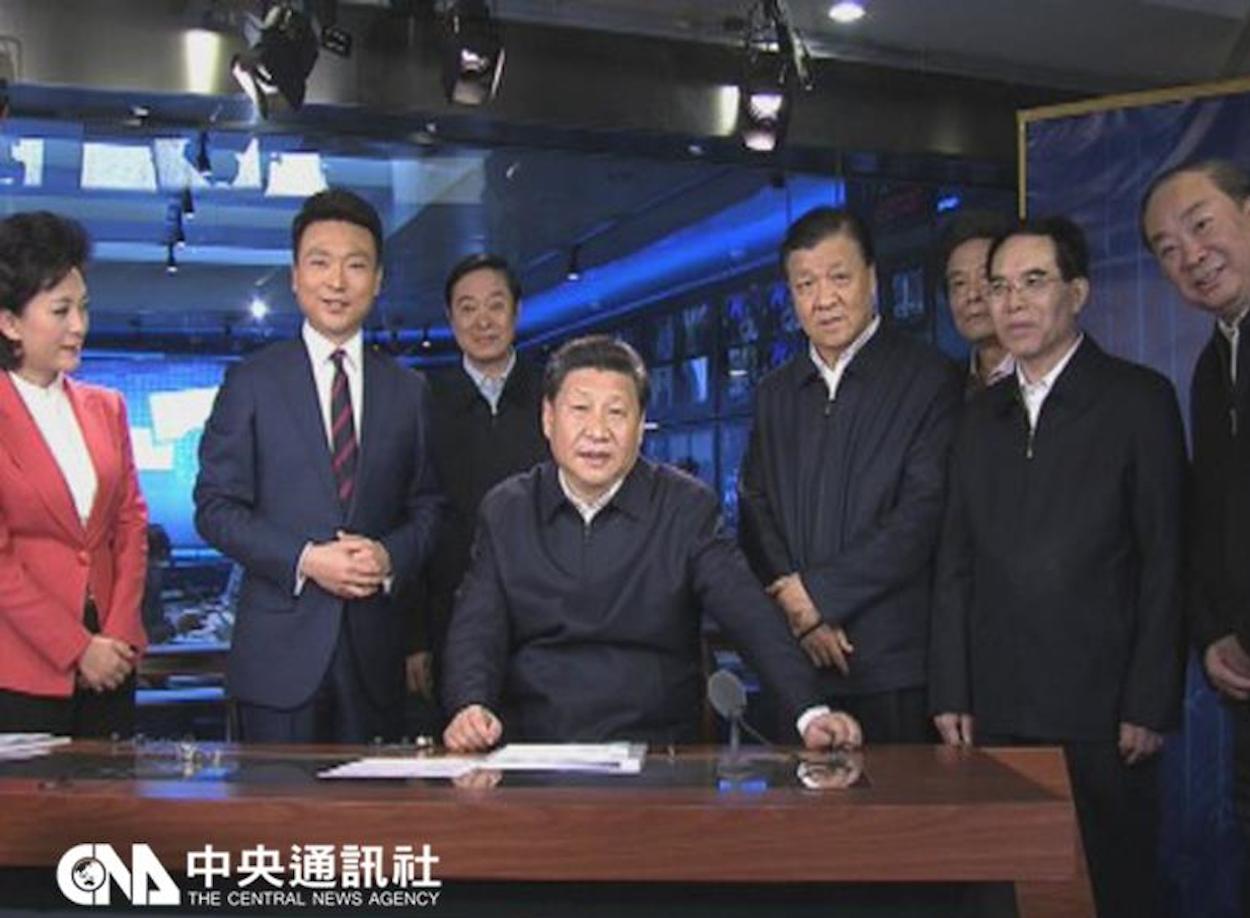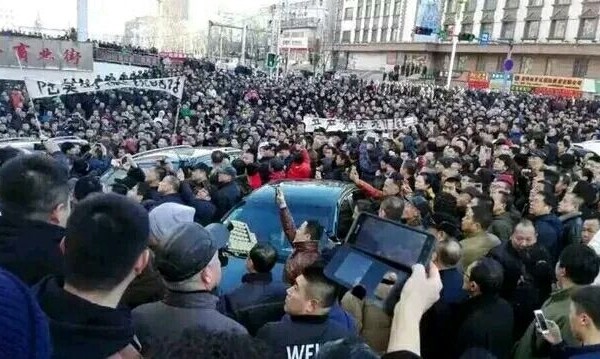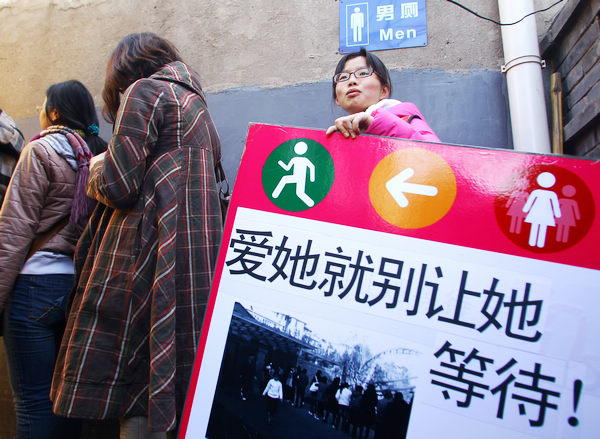by Brian Hioe
語言:
English
Photo Credit: US Department of Defense/Public Domain
IF A RECENT law passed in China to regulate foreign NGOs has provoked much anxiety, this would only be the expansion of efforts by the Chinese government to control Chinese civil society. In particular, Chinese civil society has seen increasingly restrictive measures under the Xi Jinping administration. The Chinese party-state has a general fear of civil society groups in China becoming a threat to its power.
As explained by members of groups themselves which have come under target—such as Chinese labor, environmental, and feminist groups—sometimes crackdowns on such groups is not because of measures taken specifically against feminists, labor organizers, or environmental activists, but part of this general anxiety by the party-state towards civil society groups. The party-state fears those who can organize outside of its direct control.
 Xi Jinping posing for a picture while visiting state-run media in February. Photo credit: Xinhua
Xi Jinping posing for a picture while visiting state-run media in February. Photo credit: Xinhua
At the same time, as Chinese civil society groups have come under increasing restrictions, China is also moving towards an attempt to place limitations on foreign institutions operating within China. We see a precedent of efforts to regulate foreign NGOs in the Chinese government’s announcement in February that foreign media would not be allowed to publish online. Only completely Chinese-owned companies will be allowed to report on China, in which case they will be subject to the Chinese government censorship. The crackdown on foreign media was accompanied by a call that Chinese state-run media should step up their role, suggesting that Chinese wishes for state-run media operating under its auspices to fill the vacuum in international news coverage of China, allowing for greater state control in the perception of China which circulates abroad.
In the case of the new NGO law, whose full name is the Foreign Non-Governmental Organisations Management Law, similarly, we would see the expansion of the ability of the police to terminate the activities of foreign NGOs at any time, bring in NGO employees for questioning, blacklist NGOs, or to inspect the finances of NGOs. In part, this is a reaction to the fact that laws regulating foreign NGOs were previously murky in nature and in need of clarification, but the expansion of police power is justified in the need of preserving national security. Foreign NGOs can be targeted by police if they are deemed to be endangering national security, which is a charge likely to be used to crack down on dissent.
In particular, some have pointed to the new NGO law as an attempt to split off possible connections between domestic and international NGOs in China. Domestic Chinese NGOs may in fact also be severely affected, given that many NGOs are dependent on funding or support from international NGOs. Labor, environmental, or feminist groups also sometimes make efforts to outreach with foreign groups organizing around the same cause. Chinese state-run media has, however, stated that the Chinese government is merely seeking to rightfully defend its interests and that the fear which the new law has prompted is unfounded. But if NGOs have to state served to push for some accountability on the part of the Chinese party-state, with NGOs domestic and international having to answer increasingly to the state, the state would be even more unaccountable.
 Striking workers in Heilongjiang in March. Photo credit: tw.abuluowang.com
Striking workers in Heilongjiang in March. Photo credit: tw.abuluowang.com
Nevertheless, a broader challenge for NGO groups in China is that the state already tries to supplant the role taken up by NGOs in order to neutralize the threat of potential dissent. The national state-run labor union, the All-China Federation of Trade Unions, for example, proves an impediment to labor organizing because workers associate labor organization with the state-run labor union, and it becomes a challenge to envisage forms of national labor organization outside of the state-run labor union which already exists. Along such lines, state-run women’s associations as the All-China Women’s Federation become the precise vehicles by which the state propagates campaigns against “leftover women” and other patriarchal cultural norms, the All-China Women’s Federation having been one the groups which initially popularized the negative connotations of the term with its controversial 2011 article, “Leftover Women Do Not Deserve Our Sympathy”.
But the Chinese government in particular seems to fear where Chinese domestic NGOs link up with foreign NGOs. The Chinese government, rather unfoundedly, fears that the collaboration of domestic and international NGOs will lead to organized measures against it from domestic groups in collusion with foreign governments. Hence the charges of endangering national security and the national interest. Oftentimes, it is that the Chinese government is in fact seeing threats which do not actually exist, seeing as such groups rarely go so far as to directly target the Chinese government but more often call for reform measures by the government.
Yet as is true of authoritarian measures of this kind more generally, one wonders if the actions of the Chinese government will backfire. Foreign NGOs now face the dilemma of restricting activity according to new regulations or moving out of China altogether, though it remains to be see how this law will be enforced in practice. However, domestic NGOs will probably continue to organize, and may continue to make efforts at international outreach, though it remains to be seen how they will react to the general wave of restrictions against them if they suffer from their inability to secure foreign funding or support.
 Feminist activists demonstrating during the 2012 Occupy Men’s Toilet campaign. Photo credit: China Daily
Feminist activists demonstrating during the 2012 Occupy Men’s Toilet campaign. Photo credit: China Daily
It is that increasingly restrictive measures placed on NGO organizers may actually push NGOs further towards dissent, if NGOs come to chafe under increasingly paranoiac restrictions from the Chinese government. Some commentators have gone so far as to claim that the present laws being passed against NGOs mean that it is due time for NGOs to revolt. Indeed, if media has come under increasing restrictions in recent years, this has led to backlash against the government from media actors. But it remains to be seen as to whether this leap will be taken by NGO groups, or whether this, too, is premature..


 Xi Jinping posing for a picture while visiting state-run media in February. Photo credit: Xinhua
Xi Jinping posing for a picture while visiting state-run media in February. Photo credit: Xinhua Striking workers in Heilongjiang in March. Photo credit: tw.abuluowang.com
Striking workers in Heilongjiang in March. Photo credit: tw.abuluowang.com Feminist activists demonstrating during the 2012 Occupy Men’s Toilet campaign. Photo credit: China Daily
Feminist activists demonstrating during the 2012 Occupy Men’s Toilet campaign. Photo credit: China Daily